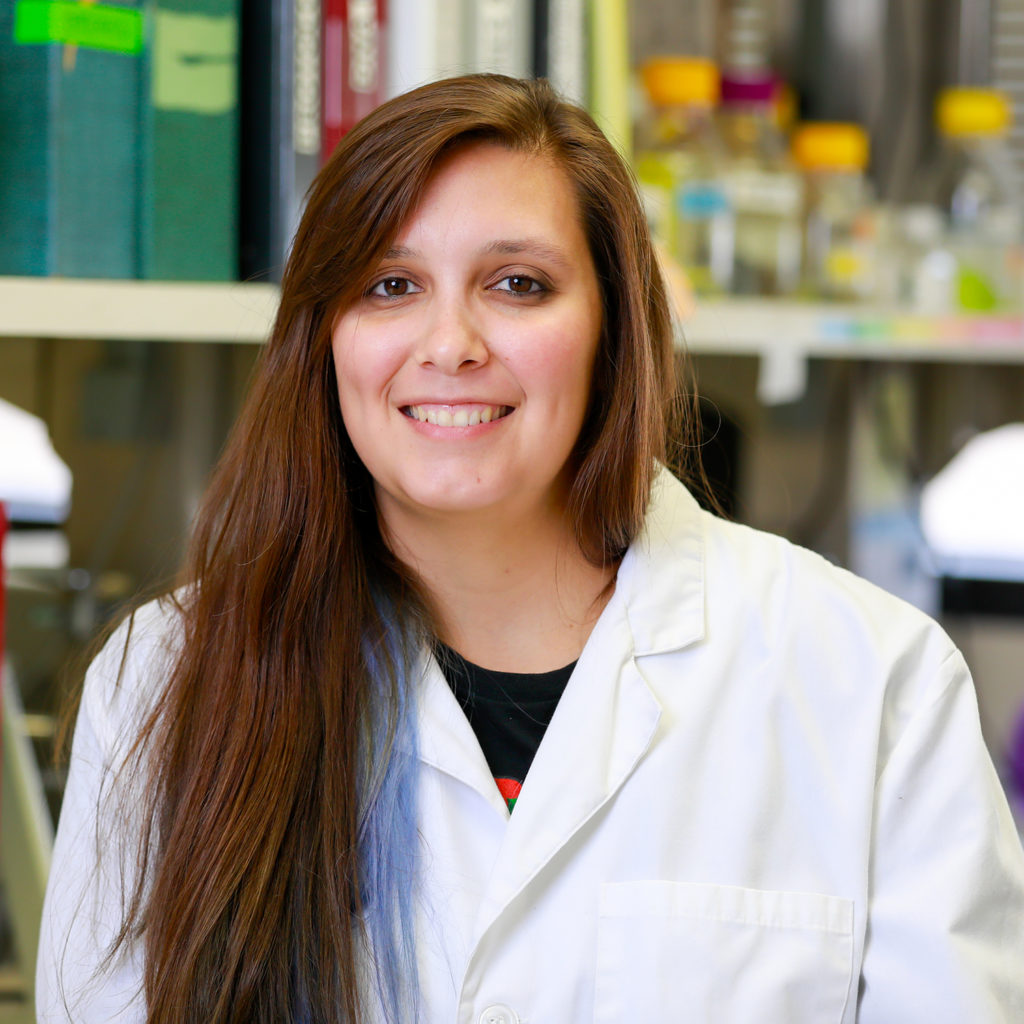CVMBS Doctoral Student Receives University-Wide Fellowship Award
Story by Aubrey Bloom, CVMBS Communications

Caitlin Castaneda, a doctoral student in the Texas A&M College of Veterinary Medicine & Biomedical Sciences’ (CVMBS) Department of Veterinary Integrative Biosciences (VIBS), was recently awarded a U.S. Senator Phil Gramm Fellowship by the Texas A&M University Graduate and Professional School.
The awards are given annually to outstanding current doctoral students for excellence in both research and teaching.
In her nomination of Castaneda, director of the molecular cytogenetics lab Dr. Terje Raudsepp said Castaneda has been truly impressive since she joined the lab in 2015 as a technician.
“Her intellectual abilities, creative thinking, and technical skills were above those of most graduate students or even postdocs,” she said. “In addition, Caitlin had inspiring work ethic and excellent people skills.”
Dr. Gus Cothran, a professor emeritus who led the lab when Castaneda was hired, also nominated her.
“Clearly a natural scientist and scholar, I consider her one of the most outstanding graduate students that I have had the opportunity to work with,” he wrote.
Castaneda’s research primarily focuses on stallion fertility and the search for the genes that impact it. As part of that research, she’s been working on an assembly of the Y chromosome, something that Brian Davis, assistant professor in VIBS, said is unique.
“Her work on the horse Y chromosome will continue to yield results no one else in the world is producing,” he said. “The careful and methodical nature required to construct a Y chromosome from scratch is so daunting that few labs will attempt it. Ms. Castaneda embraces it with eagerness.”
In 2012, the molecular cytogenetics lab discovered the first gene associated with stallion fertility, and as a result of Castaneda’s work, a diagnostic test for stallion subfertility was published this year. However, discovery of the actual causative mutation still remains a goal to achieve.
“We’re hoping to find more genes and then create more diagnostic tests so that when horses come through the clinic, we can have a molecular screening for fertility genetics in addition to the routine breeding soundness exam,” she said.
This has potentially huge implications in the equine industry, in which stallion fertility is of significant economic interest.
Down the road, Castaneda hopes to bring what she’s learned in animal medicine to research in human fertility, as well.
In addition to her proven skills as a researcher—having authored eight publications, including three as the first author—she has also impacted a number of students as a teacher and mentor.
Students like recent graduate Oriana Ramos who have worked with her in the lab describe her as having a tireless work ethic, while at the same time taking time to work with them individually.
“Clearly a natural scientist and scholar, I consider [Caitlin Castaneda] one of the most outstanding graduate students that I have had the opportunity to work with.”
Dr. Gus Cothran
“I always valued her patience and willingness to go above and beyond to teach me not only the immediate background of any projects assigned to me but any relevant information that she knew would prepare me for a successful career in genetics,” Ramos said. “Caitlin taught me to be hands-on with my learning and encouraged me to have confidence in my skills, even when venturing into territory I hadn’t experienced yet.”
Undergraduate student Ethan Wall described her patience while teaching him complex processes like extracting DNA and running polymerase chain reactions (PCRs).
“Caitlin has managed to be incredibly patient with me, a feat that I am sure is not easy,” he said. “After working under her this past year, I truly cannot fathom that there are many people out there who are as deserving of this prestigious award as she is. As someone who has experienced her work ethic firsthand, I have no doubt that she will take full advantage of this award.”
The U.S. Senator Phil Gramm Fellowships are given annually by the Texas A&M University Graduate and Professional School to outstanding current doctoral students whose excellence in both research and teaching exemplifies the meaning of scholarship and mentorship in the highest sense. The fellowship includes a $5,000 award to help the winners continue their studies.
Made possible by gifts from donors in honor of Gramm, these awards reflect Gramm’s appreciation of the vital role graduate students play in helping Texas A&M achieve its teaching and research mission, as well as honor his legacy of scholarship and public service.
Gramm received a Ph.D. in economics from the University of Georgia and served as an economics professor at Texas A&M for 12 years before turning to politics. Gramm first represented Texas’ 6th congressional district in the U.S. House of Representatives before being elected to the U.S. Senate, where he served for nearly two decades. He is currently the senior partner of Gramm Partners, a public policy firm in Washington, D.C., and is the senior advisor at U.S. Policy Metrics.
###
For more information about the Texas A&M College of Veterinary Medicine & Biomedical Sciences, please visit our website at vetmed.tamu.edu or join us on Facebook, Instagram, and Twitter.
Contact Information: Jennifer Gauntt, Director of VMBS Communications, Texas A&M College of Veterinary Medicine & Biomedical Sciences, jgauntt@cvm.tamu.edu, 979-862-4216


